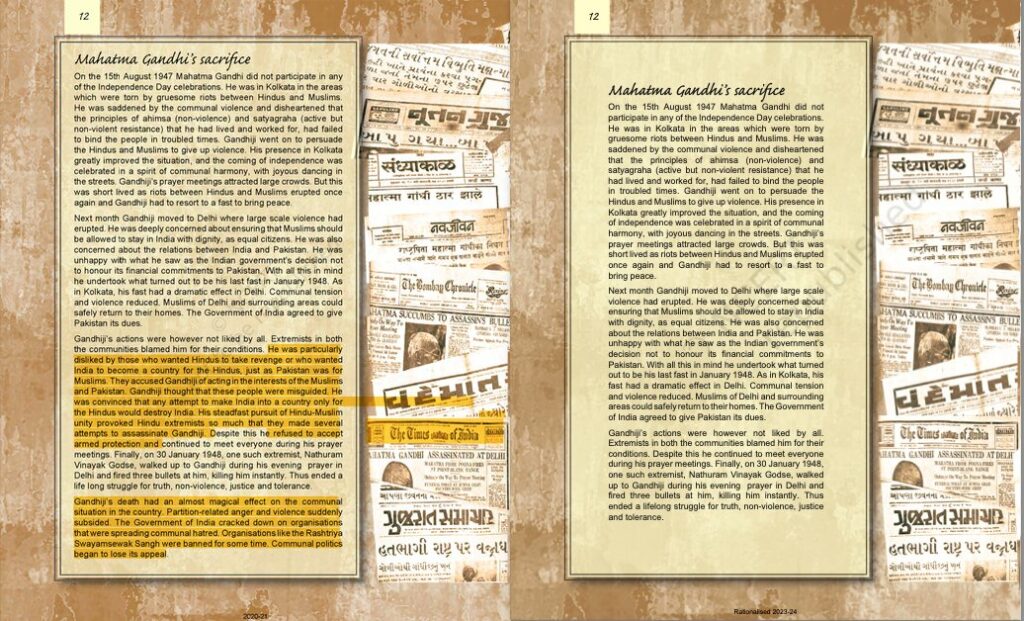India’s ruling BJP party is under fire once again for a concerning revisionist trend in school textbooks. Several social science textbooks in the national syllabus have been edited to remove references to the historic Mughal empire, Gandhi’s support of Hindu-Muslim unity, and to religious riots involving current PM Narendra Modi. The moves echo the BJP’s continued pivot to ever-more rigorous support of a Hindu nationalist mode of governance.
While in power, the BJP has promoted a monocultural view of India, attempting to paint the country as solely Hindu, ignoring and even erasing its rich multicultural reality.
Rewriting history has always been a part of this agenda, and the BJP has been open about this fact – in 2019, home affairs minister Amit Shah said in a speech that “it is our responsibility to write our history.” Even in 2002-2004, during the first BJP administration, significant changes were made to textbooks to glorify Hindu heritage.
This revisionist thrust has only picked up speed ever since. In recent years, references to the Muslim Mughal empire have been amended or outright removed in social science textbooks. This trend has been upheld in the most recent editions of political science and history textbooks released by India’s National Council of Educational Research and Training (NCERT).
The Mughals ruled over much of modern-day India between the 16th-19th centuries, during which time the subcontinent enjoyed widespread peace, prosperity, and a cultural boom – the Taj Mahal is the most famous Mughal-era monument. Now chapters like ‘Kings and Chronicles; the Mughal Courts’, and ‘Central Islamic Lands’ have been removed from senior high school textbooks.
And the changes are not limited to Islamophobic deletions – the BJP’s particular socio-political agenda is blatantly promoted. References to the dislike Hindu nationalists had for Gandhi have been purged, as well as how they made multiple assassination attempts on the leader of Indian independence.
In fact, Gandhi was eventually murdered by Hindu nationalist Nathuram Godse, after which the militant nationalist group RSS was banned for a brief period. References to this ban have also been purged – presumably because the BJP remains the political arm of the RSS.
Furthermore, chapters related to democratic uprisings and religious riots have also been removed. Passages on the caste-critical Dalit movement, protests led by key figures like Medha Patkar, and India’s first ‘Emergency’ period of 1975-77, when fundamental political rights were suspended, have been edited out. On the other hand, figures like the hardline Hindu nationalist Vinayak Damodar Sarvarkar are glorified as “great patriots”.

Similarly, writings on the Gujarat riots of 2002 have also gotten the chop. The riots were brutal attacks in the state of Gujarat on Muslim families, with over 1000 casualties reported.
Current PM Narendra Modi was the chief minister in the state at the time, and was accused of being complicit in the violence. A BBC documentary on the event was recently banned by the Indian government.
In response to the most recent round of revisions, more than 250 Indian historians issued a public statement, condemning the decisions and alleging NCERT’s changes are against India’s constitutional ethos. Academics like Suhas Palshikar, who has worked with the government on textbook committees previously, warn that “the next few generations will be victims” of a subjective education.
Noting a similar trend worldwide and particularly in America, the NGO PEN America stated NCERT’s changes “rob students of the complexity and nuance essential for critically appraising their societies and appreciating their duties of democratic citizenship.”
Cover photo by Romina BM on Unsplash.
Follow Maddie’s journalism on Twitter.
Sign Up To Our Free Newsletter